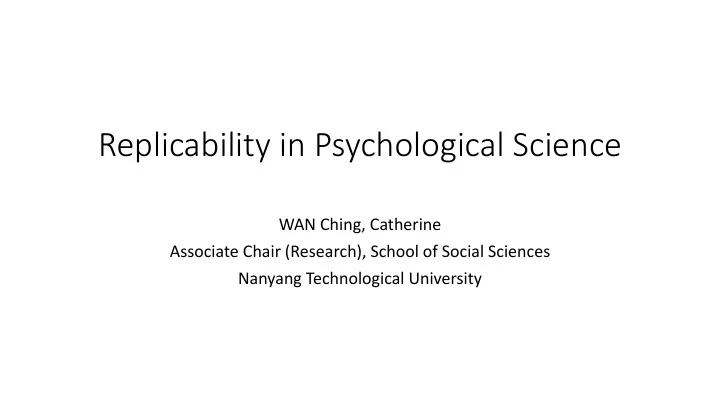

Replicability in Psychological Science WAN Ching, Catherine Associate Chair (Research), School of Social Sciences Nanyang Technological University
Does Psychology care about replicability?
Encouraging Replication and Open Science • Top journals as signatories of Open Science Framework (OSF) Transparency and Openness Promotion (TOP) • Journal of Personality and Social Psychology • Requires data sharing for verification of published findings • Encourages sharing of data, analytic methods and research materials for replication • Expects full disclosure of data-dependent decisions • Encourages submission of replication of important findings and registered replication reports
Encouraging Replication and Open Science • Top journals as signatories of Open Science Framework (OSF) Transparency and Openness Promotion (TOP) • Psychological Science • Inclusion of Research Disclosure Statements in all manuscript submissions • Inclusion of Open Practice Statement in all manuscript • Award of Open Practice Badges Open Materials Badge Open Data Badge Preregistered Badge • Publishes preregistered direct replications of studies
How replicable are Psychology studies? • Reproducibility Project: Psychology (Open Science Collaboration, 2015) • Direct replication of 100 empirical studies in cognitive and social psychology from top journals Replication p < .05 in Original effect size Subjective "yes" to original direction within replication 95% CI "Did it replicate?" Overall 36 47 39 Social (JPSP) 23 34 25 Social (PSCI) 29 40 32 Cognitive (JEPLMC) 48 62 54 Cognitive (PSCI) 53 60 53
Fig. 1 Density plots of original and replication P values and effect sizes. Open Science Collaboration Science 2015;349:aac4716
The Not-So-Simple Answer • The meaning of replication failure • Original finding was a false positive? • Replication finding was a false negative? • Publication bias and the file-drawer problem
The Not-So-Simple Answer • The meaning of a replication failure • The psychological phenomenon is time- /culture- /context-sensitive that successful replication should not be expected (Greenfield, 2017) Replication p < .05 in Original effect size Subjective "yes" to original direction within replication 95% CI "Did it replicate?" Overall 36 47 39 Social (JPSP) 23 34 25 Social (PSCI) 29 40 32 Cognitive (JEPLMC) 48 62 54 Cognitive (PSCI) 53 60 53 (Open Science Collaboration, 2015)
The Not-So-Simple Answer • Tradeoff in high quality science (Finkel, Eastwick, & Reis, 2017) • Replicability is only one of core characteristics of high quality science (discovery, replicability, internal validity, external validity, construct validity, consequentiality, cumulativeness) • With finite resources, individual researchers often need to prioritize the core characteristics • As a field, the pursuit of replicability should not always be prioritized over other core characteristics of high quality science
“Innovation points out paths that are possible; replication points out paths that are likely; progress relies on both.” Open Science Collaboration (2015, acc4716-7)
Recommend
More recommend